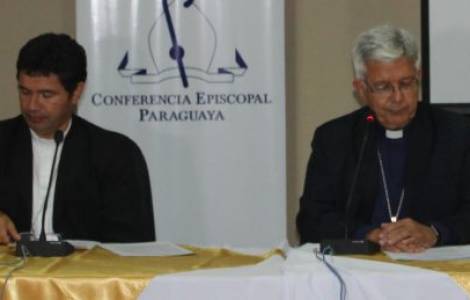
Asuncion (Agenzia Fides) - "A reflective, serious, responsible and objective debate of political leaders, in dialogue with society", is what the Bishops of Paraguay ask for on the occasion of the discussion in Parliament on the possible change regarding the electoral law, scheduled for today, April 25 . In their message entitled "What values guide our democracy?", sent to Agenzia Fides, the Bishops stress that "the subject is complex and delicate" and that in society there is a growing desire "to improve the quality of political representation in the organs of power through the participation of citizens in the selection of the best, having the possibility of choosing and not only voting for pre-established, closed and blocked lists".
Faced with the various projects that will be taken into consideration by senators and deputies, the Bishops present some reflections in the light of the Social Doctrine of the Church "which could guide the discussion and the decisions that will be taken".
Inspired by what the Aparecida Document states on “an effectively representative and participatory democracy”, first of all the Bishops invite us to reflect on whether “behind the initiative of formal change of the rules, there is a convinced acceptance of the values that inspire democratic procedures: the dignity of every human person, respect for human rights, the assumption of the common good as a criterion for the end and norm of political life, the commitment to guarantee justice, stability and social peace, the right use of power".
The second reason for reflection concerns the moral aspect of democracy, which "is a tool and not an end", and must be inspired by the highest values. The Bishops therefore urge "to widen our gaze to pursue a profound electoral reform". They therefore propose a series of questions to reflect on: "Do we have an electoral system that allows free, responsible and transparent participation of citizens in the elections? Does the electoral system guarantee the true equality of participation of political parties and movements? Are polls and electoral propaganda regulated according to the needs of a true democratic system? Is there the possibility of reinforcing the institutionalization of the electoral process without interference from sectors that could mislead the vote at the time of the ballot?"
In the last point of their message, the Bishops recall that "democracy is not limited to electoral times or formal mechanisms of choice", but "is based on free participation, respectful and responsible for all citizens". They therefore invite reflection on the participation of every citizen in "basic" initiatives (in the neighborhood, in school, in public services, in trade unions); on one's contribution to the common good and social justice; on "active, creative, adult, peaceful participation". "We must move from a purely formal electoral democracy - they reiterate - to a democracy as a lifestyle and as a way of exercising politics to achieve the common good".
In conclusion, the Bishops of Paraguay urge political leaders "to reflect calmly and honestly on the motivations and values that guide their decisions, to legislate responsibly, to strengthen democratic institutions in order to promote the common good of society and respect for human rights without restrictions". Finally, an invitation to all, especially to committed Christians, "to make a significant contribution to strengthening the credibility and stability of institutions". (S.L.) (Agenzia Fides, 25/4/2019)